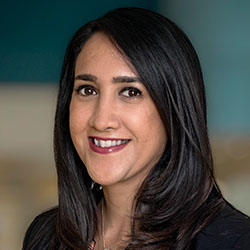IBD Treatment: A Q&A With Dr. Namita Singh
May 1, 2019
What causes inflammatory bowel disease (IBD)? How has our understanding of it changed over time?
 Dr. Namita Singh, physician, Seattle Children’s: IBD is a multifactorial chronic disease. It is due to the overly active immune response to gastrointestinal (GI) enteric bacteria in genetically susceptible individuals, triggered by environmental factors. More than 200 genetic loci have been identified as playing a role in IBD, with some (i.e., NOD2) being associated with more progressive disease. Using our understanding of the inflammatory pathways affected in IBD, newer medications have been developed targeting these various pathways. The enteric bacteria, or GI microbiome, is known to be very different in IBD — with less diversity — than in healthy non-IBD patients. There has been an increase in IBD incidence worldwide over the past decade, suggesting a large impact in environmental factors rather than genomic shifts. For example, immigrants from countries with a lower prevalence of IBD assume a much higher risk when they immigrate to the United States, and their children even more so. The fastest-growing population is the pediatric Crohn’s disease population, and we are seeing IBD in very young patients as well.
Dr. Namita Singh, physician, Seattle Children’s: IBD is a multifactorial chronic disease. It is due to the overly active immune response to gastrointestinal (GI) enteric bacteria in genetically susceptible individuals, triggered by environmental factors. More than 200 genetic loci have been identified as playing a role in IBD, with some (i.e., NOD2) being associated with more progressive disease. Using our understanding of the inflammatory pathways affected in IBD, newer medications have been developed targeting these various pathways. The enteric bacteria, or GI microbiome, is known to be very different in IBD — with less diversity — than in healthy non-IBD patients. There has been an increase in IBD incidence worldwide over the past decade, suggesting a large impact in environmental factors rather than genomic shifts. For example, immigrants from countries with a lower prevalence of IBD assume a much higher risk when they immigrate to the United States, and their children even more so. The fastest-growing population is the pediatric Crohn’s disease population, and we are seeing IBD in very young patients as well.
What modalities are used to diagnose IBD?
Dr. Singh: We start with a thorough history and physical exam. Blood and stool studies are obtained, primarily to exclude infections. An upper endoscopy and colonoscopy are performed for direct visualization of the intestinal mucosa and to attain mucosal biopsies, which are used to aid in the diagnosis of IBD. Endoscopy evaluates only a portion of the small intestine (duodenum, terminal ileum). Thus, cross-sectional imaging — CT (computed tomography) enterography, MR (magnetic resonance) enterography — is used to evaluate for suspected small bowel involvement. Video or wireless capsule endoscopy is sometimes used for direct visualization of the small bowel mucosa in patients.
There are so many new medications, including biologics. How is treatment determined?
Dr. Singh: This is an exciting time to be treating and researching IBD. In the past five years, at least three new medications with unique mechanisms of action have become available. Currently, there are biologic medications that target TNF-alpha (infliximab, adalimumab), anti-adhesion antibodies (vedolizumab), IL12/23 inhibitors (ustekinumab), and the small molecule Janus kinase inhibitor (tofacitinib). More are coming through the pipeline, although not all are currently approved by the Food and Drug Administration (FDA) in the pediatric population. Seattle Children’s is involved in clinical trials for several of these medications in the pediatric IBD population.
Although Crohn’s disease and ulcerative colitis are the two diseases encompassed by IBD, there are truly hundreds, if not more, phenotypes. No two patients have the exact disease or response to medications. We treat patients based on disease location and severity. There are studies showing that in higher-risk IBD patients, initiating a biologic therapy early in the disease course decreases the likelihood of disease complication and progression. With more medication options now to choose from, we are able to individualize therapies. Together with patients and their families, we make these decisions, considering the risks and benefits of different therapies.
What makes the IBD team at Seattle Children’s unique?
Dr. Singh: Our team is leading research studies in IBD. We have studies utilizing dietary approaches in the treatment of IBD, including exclusive enteral nutrition and the Specific Carbohydrate diet. We offer several clinical trials for new medications, including small molecules and biologics, in the pediatric IBD population. We have the expertise in and utilize therapeutic drug monitoring to optimize dosing in biologic-treated IBD patients, leading to improved outcomes. Our multidisciplinary approach with our IBD physicians, nurses, social work and psychology colleagues encompasses treatment of the entire patient, focusing on healing, quality of life and overall health.
Seattle Children’s IBD team is active at leading IBD programs at the national level. We are closely involved with the Crohn’s and Colitis Foundation, and our physicians and nurses volunteer at the Crohn’s and Colitis Foundation Camp Oasis, a camp for children with IBD, as the medical directors and medical team.